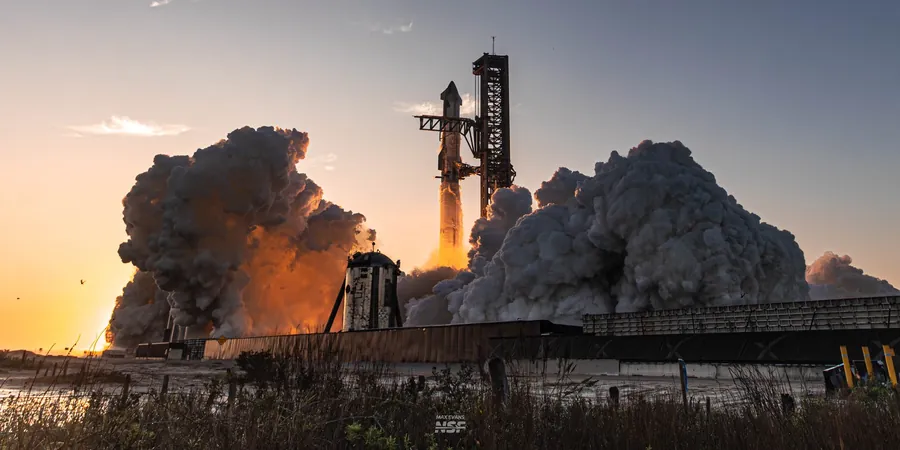
New Study Unveils Shocking Sound Levels of SpaceX's Starship: A Comparison with SLS and Falcon 9!
2024-11-18
Author: Charlotte
A Groundbreaking Study on Rocket Noise Levels
A groundbreaking study from Brigham Young University (BYU) has revealed surprising insights into the thunderous sound levels generated by SpaceX's Starship and Super Heavy rocket systems. Conducting their research during Starship's fifth flight test in April 2023, a team of scientists has uncovered that not only is Starship the most powerful rocket ever flown, but it also produces sound levels that are significantly louder than both NASA's Space Launch System (SLS) and SpaceX's Falcon 9.
Eye-Opening Measurements
In their meticulous study, led by physicist Kent Gee, the team traveled to SpaceX's launch site in Boca Chica, Texas, to gather acoustic data from eight strategically chosen locations ranging from 9.7 km to 35.5 km from the launch site. What they discovered was staggering. On analyzing the sound produced during Starship's launch and Super Heavy's landing, they utilized advanced metrics such as A-weighting and Z-weighting to provide a comprehensive picture of how sound is perceived by the human ear versus unaltered sound levels.
Their analysis revealed discrepancies between real-world sound data and the FAA's Environmental Assessment predictions. In some areas, such as Laguna Vista and Brownsville, the study noted that the predicted sound energy levels were overestimated by 10-19 decibels. Moreover, at a distance of 35.5 km, the measured maximum noise level was nine decibels louder than predicted. These unexpected findings highlight the urgent need for refining models used to forecast rocket noise, especially as SpaceX prepares for increased launch activities, including upcoming tests planned in Florida.
Sonic Boom Showdown: Starship vs. Falcon 9 and Concorde
One of the most riveting elements of the study was the examination of sonic booms. The research uncovered that the sonic boom produced by Super Heavy's landing is incredibly powerful, reaching noise levels of around 110 decibels at a distance of 20 km, which is approximately 50% louder than the iconic Concorde's sonic boom. In comparison, the Falcon 9 booster produces around 90 decibels at the same distance, making Super Heavy's sonic boom a startling phenomenon.
Interestingly, researchers identified that the noise generated during Super Heavy's landing was equivalent to the noise at launch, prompting further investigation into this alarming revelation.
A Call for Action on Noise Pollution
As SpaceX continues to push the boundaries of rocket technology, the findings of this study become crucial in understanding the environmental impact of high-frequency sound waves and sonic booms generated by rocket launches. With evidence indicating that Starship's launch noise exceeds SLS and Falcon 9 by a considerable margin—at least having the noise impact of 10 Falcon 9 launches or equivalent to that of four to six SLS launches—concerns about how such sounds might affect wildlife, resident communities, and ecosystems around launch sites are paramount.
Gee and his team underscore the necessity for ongoing research, expressing optimism that as Starship’s launch cadence increases, new opportunities for data gathering will emerge. This will allow scientists to gain deeper insights into the audible consequences of heavy rocket launches.
What Lies Ahead
The implications of the research are profound for both SpaceX and regulatory authorities as they plan future launches. The BYU team is set to return for further measurements during Starship's sixth flight test, with a greater understanding of the sound profile required for future assessments.
As Starship gears up for countless launches, it becomes essential to strike a balance between progress and environmental stewardship. Stay tuned, as the roar of Starship will definitely echo into the future!









 Brasil (PT)
Brasil (PT)
 Canada (EN)
Canada (EN)
 Chile (ES)
Chile (ES)
 España (ES)
España (ES)
 France (FR)
France (FR)
 Hong Kong (EN)
Hong Kong (EN)
 Italia (IT)
Italia (IT)
 日本 (JA)
日本 (JA)
 Magyarország (HU)
Magyarország (HU)
 Norge (NO)
Norge (NO)
 Polska (PL)
Polska (PL)
 Schweiz (DE)
Schweiz (DE)
 Singapore (EN)
Singapore (EN)
 Sverige (SV)
Sverige (SV)
 Suomi (FI)
Suomi (FI)
 Türkiye (TR)
Türkiye (TR)